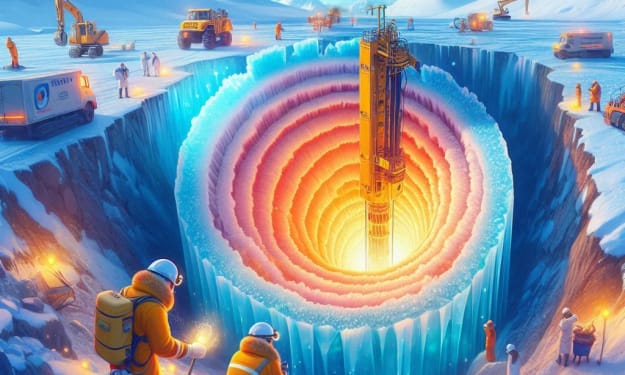The Intersection of Global Warming and Globalization: Exploring the Complex Relationship between the Two
Examining the Impacts of Globalization on Climate Change and How Addressing These Issues Can Help Create a More Sustainable World

Global warming and globalization are two of the most pressing issues facing our world today. While they may seem unrelated at first glance, they are actually deeply intertwined, with each one having a significant impact on the other. In this blog, we will explore the relationship between these two issues, the causes and effects of each, and some potential solutions for mitigating their negative impacts.
What is Global Warming?
Global warming is the long-term increase in Earth's average surface temperature. It is primarily caused by the increase of greenhouse gases, such as carbon dioxide, in the atmosphere. These gases trap heat from the sun, causing the Earth's temperature to rise. Global warming has a wide range of effects, including rising sea levels, more frequent and severe weather events, and changes in ecosystems and wildlife.
What is Globalization?
Globalization is the process of increasing interconnectedness and interdependence between people, companies, and countries around the world. It is driven by advancements in transportation, communication, and technology, as well as by the growth of multinational corporations. Globalization has many positive effects, such as increased economic growth and cultural exchange, but it also has negative effects, such as exploitation of workers and environmental degradation.
The Connection between Global Warming and Globalization
Global warming and globalization are connected in several ways. For one, globalization has led to an increase in global carbon emissions, which is a major contributor to global warming. As companies have expanded their operations around the world, they have relied more heavily on transportation and energy, both of which produce carbon emissions. Additionally, globalization has led to a rise in consumerism, with people purchasing more goods and traveling more frequently, both of which also contribute to carbon emissions.
Furthermore, global warming has had an impact on globalization. Changes in weather patterns and rising sea levels have disrupted supply chains and caused damage to infrastructure, leading to economic losses for companies and countries. Extreme weather events have also had a negative impact on tourism, which is an important industry for many countries. Additionally, the effects of global warming on ecosystems and wildlife have threatened the livelihoods of many people who depend on them for food and income.
Causes and Effects of Global Warming
As mentioned earlier, global warming is primarily caused by the increase of greenhouse gases in the atmosphere. This increase is largely due to human activity, such as burning fossil fuels for energy and transportation. Deforestation, agriculture, and land use changes also contribute to greenhouse gas emissions. The effects of global warming are wide-ranging and severe, with impacts on ecosystems, human health, and the global economy.
One of the most notable effects of global warming is rising sea levels. As glaciers and ice caps melt, the sea level rises, which can cause flooding in coastal areas. This can damage infrastructure, homes, and businesses, and displace people from their homes. Extreme weather events, such as hurricanes, tornadoes, and heatwaves, have become more frequent and severe due to global warming. These events can cause significant damage to property and infrastructure, and can also lead to loss of life.
Global warming also has negative effects on ecosystems and wildlife. As temperatures rise, many species are forced to adapt or face extinction. This can have cascading effects on entire ecosystems, disrupting food chains and causing imbalances in the natural world. Additionally, global warming can have negative impacts on human health, as it can lead to the spread of diseases and exacerbate air pollution.
Causes and Effects of Globalization
Globalization is driven by a variety of factors, including advancements in technology, transportation, and communication. As companies expand their operations around the world, they are able to access new markets and reduce costs by taking advantage of cheaper labor and resources. However, globalization also has negative effects, particularly for workers and the environment.
One of the main negative effects of globalization is the exploitation of workers. As companies seek to reduce costs, they often rely on low-wage labor in countries with weaker labor laws. This can lead to poor working conditions, low wages, and even child labor. Additionally, globalization can lead to job losses in developed countries, as companies move their operations to countries with cheaper labor.
Globalization also has negative effects on the environment. As companies expand their operations, they often consume more resources, leading to increased pollution and resource depletion. Additionally, the transportation of goods and people around the world produces significant carbon emissions, contributing to global warming.
Solutions for Mitigating the Negative Impacts of Global Warming and Globalization
Both global warming and globalization are complex issues with no simple solutions. However, there are steps that can be taken to mitigate their negative impacts.
To address global warming, it is important to reduce greenhouse gas emissions. This can be done by transitioning to renewable energy sources, such as solar and wind power, and by increasing energy efficiency in buildings and transportation. Additionally, reducing deforestation and promoting sustainable land use practices can help to sequester carbon and reduce emissions. On an individual level, people can reduce their carbon footprint by using public transportation, reducing meat consumption, and conserving energy in their homes.
To address the negative effects of globalization, it is important to promote fair labor practices and protect workers' rights. This can be done through stronger labor laws and regulations, as well as through consumer pressure on companies to ensure that their supply chains are ethical and sustainable. Additionally, promoting local and regional economies can help to reduce the reliance on global supply chains and promote more sustainable and resilient economic systems.
Culmination
Global warming and globalization are two of the most pressing issues facing our world today. They are deeply interconnected, with each one having a significant impact on the other. The causes and effects of both issues are wide-ranging and severe, and there are no simple solutions. However, by taking steps to reduce greenhouse gas emissions and promote sustainable practices, we can mitigate the negative impacts of global warming. Similarly, by promoting fair labor practices and local and regional economies, we can work to reduce the negative impacts of globalization. It is up to all of us to take action to address these issues and create a more sustainable and just world for future generations.
About the Creator
Enjoyed the story? Support the Creator.
Subscribe for free to receive all their stories in your feed. You could also pledge your support or give them a one-off tip, letting them know you appreciate their work.






Comments
There are no comments for this story
Be the first to respond and start the conversation.